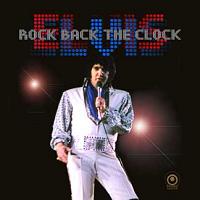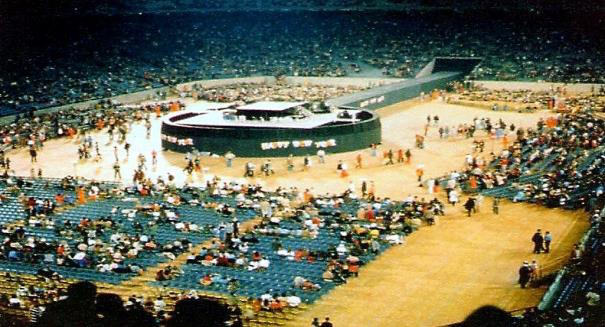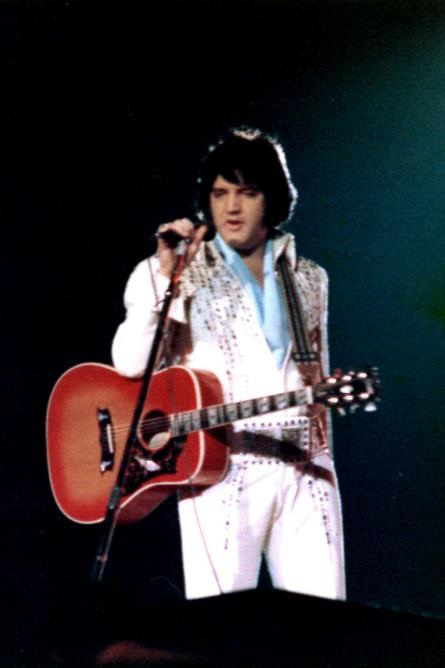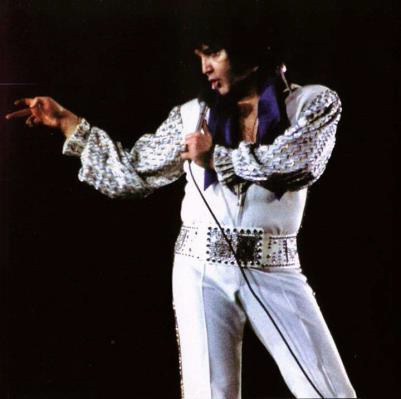


Not long after Elvis' tour throughout the East; Midwest; Texas; and Lake Tahoe in September and October of 1974, the king would turn 40 years old. Shortly after his January 8th birthday, Elvis would be "rushed" to the hospital on January 29th after his girlfriend Linda Thompson would awake to his labored breathing. Elvis' doctor, George Nichopoulos, justified the hospital admittance for a "liver problem" and some tests. Speculation about the singer's health ensued. Many still believe this incident to be an overdose incident due to Elvis's frequent use of narcotics during this period. During the September-October tour of 1974, Elvis gave performances ranging from great to downright terrible. He was likely depressed during this tour; often angrily ranting and raving on stage, singing downtrodden heartbreak songs, and just sounding ill and raspy on stage. Tonight Show host Johnny Carson would say in one of his monologues on Elvis' birthday that he was now "Fat and 40." However, after this "overdose" in January, Elvis would gain two different things; weight, and a newfound inspiration. He would return to the stage in March of 1975 and throughout the year, would go on a stretch of concerts and tours that were some of the best of his career; trying new songs, set-lists, and jumpsuits. Elvis' work in 1975 would culminate in him concluding the year with his first ever New Year's Eve show at the Pontiac Silverdome for over 60,000 eager fans on an odd, square, two-tiered stage.

Also Sprach Zarathustra begins right at the outset of the album. There is an air of nervousness while the band plays the piece. After all, they have a reason to be nervous; this is the largest crowd that Elvis has ever played in front of. Any missed notes or sound system errors would ring throughout the stadium like a train whistle. This version is a good effort by the band, but it sounds inferior simply due to crowd noise and the audio quality. Towards the end of the opening theme, the crowd loudly cheers, for they know the arrival of their king is nigh. A note, many sources say that the concert was at 8:30. However, Elvis did not hit the stage until 11:10 p.m.
 (c) George Hill (c) George Hill |
Ronnie Tutt beats on the drums and the iconic Hail Elvis theme plays to loud cheers and resounding applause. The cheers get even louder though when Elvis walks out of the Silverdome's tunnel onto the walkway towards the stage. A plump and pale Elvis struts out wearing his all white, Rainfall jumpsuit, which he debuted in Las Vegas earlier in December. The Rainfall is white and has minimal designs and is relatively plain compared to other jumpsuit designs from 1975. Hail Elvis feels like it lasts for nearly an eternity (about a minute and a half), but the only reason for this is that the distance from the tunnel of the stadium to middle of the stadium is approximately 60 - 70 yards. Despite the length, the band opens well.
The trumpets stop and Elvis wastes little time getting on the microphone for See See Rider. He lets out a forceful "Oh See, See See Rider..." and soon after howls out a "Well I'm goin'..." You can immediately tell that Elvis feels confident onstage among the massive audience. His voice is not the same as it was in '69 or '70, but he sounds focused and willing to perform to the best of his ability. Before the song ends, he lets out a long "Girl you maaaaade, and now, now your lovin' man has gone..." See See Rider ends strong, and the audience is happy with it. |
The "wells" begin. J.D. Sumner lets out a low "well" and Elvis jokes, "Well... that's it, thank you very much..." I Got a Woman starts, and it is a very standard 1975 version of the song. Elvis remains focused throughout the whole song. Despite it not being a very special version, it's still quite enjoyable. Amen begins and the Sweet Inspirations, at first, thought that Elvis would only do one verse. Elvis has them to three. Elvis jumps into his "striptease" routine and then says, "That's enough." He sounds like he goes again, but it was pretty short if he did. J.D. does the dive-bomb routine and Elvis tells the crowd, "That was uh... that was fair J.D. But uh, you know, you being the lowest bass singer... I think you can do better, alright? Watch him this time..." Elvis does another enthusiastic version of Amen and J.D dive-bombs again. Elvis closes out the song forcefully.
In front of the largest crowd he's ever performed in front of, Elvis tears his pants. Elvis exclaims, "60,000 people saw it and I ripped the seat out of my pants." Elvis tells the crowd, "If I appear nervous it's because I am. This is the largest crowd we've ever played to... I had to go and rip my pants." It then sounds like he tells someone he needs a new suit, but you can't tell who he's talking to. He doesn't seem to be very upset or angered by this incident. In fact, he appears to be in pretty good spirits despite the accident. However, many of Elvis' friends claim that he was nervous backstage because of the size of the audience. According to Elvis' friend T.G. Sheppard, "After the show [Elvis] just exploded..." There were apparently several things that got on the kings nerves that day, but the wardrobe malfunction was the last straw. However, the show goes on.
Without changing suits, yet, Elvis begins Love Me. He sings a strong version. He lets out a pretty intense "...beating close to mine!" Elvis even sings two extra stanzas of the song, doing his best on the last extra stanza to really sing the "beating close to mine" part. He concludes the song with a pronounced but short "Oh, yeah!" Love Me ends pleasurably.
Elvis then jokes saying that, "I need all the help I can get..." referring to his backup singers in Love Me.
Elvis then says that this next song is an older record called "Trying to Get to Y'al- You." Elvis starts Trying to Get to You. He begins the song and sounds good. He sounds in tune with the music and his effort shows throughout the song. He forcefully sings the parts "Well, I read your lovin' letter..." and "Well, there's nothin' that could hold me..." Elvis also does a great job with the note changes on the words "thing" and "true." Elvis ends the emphatically as the trumpets back him up. Trying To Get to You was triumphant.
Elvis soon begins singing And I Love You So, which was a song from his 1975 album, Today. Elvis sings the beginning of the song low and seriously, and he continues the whole song like this. He makes a good effort in the parts "And yes, I know, how lonely life can be..." when the emotional tone of the song heightens. The band also does a splendid job in this song, especially Kathy Westmoreland when she hits those nearly unreachable high notes. The song is pleasurable and breaks up Elvis' old hits nicely.
Elvis immediately begins All Shook Up. The song is performed very quickly, as most Elvis '50s hits were in the '70s. Elvis performs a mediocre version of the song, but not bad.
Next is Teddy Bear/ Don't Be Cruel. This medley is pretty similar performance-wise to All Shook Up. However, Elvis uses a bit more vocal effort in the Teddy Bear portion of the song. Don't Be Cruel was incredibly standard, nothing spectacular.
Elvis then jumps into a somewhat unexpected version of Heartbreak Hotel. He sounds good while singing and channels his voice into the song appropriately. The guitar solo by James Burton sounds fantastic. Heartbreak Hotel ends well and was performed better than All Shook Up or Teddy Bear/ Don't Be Cruel.
Elvis hastily continues his oldies with One Night. He begins with a slightly elongated "One Night..." He then continues the song in a pretty energetic manner. He exerts his voice quite a bit in this version. His voice sounds high, but it never breaks, and he is in tune with the music the whole time. During both choruses, he exclaims, "Life without you, has been, has been too lonely too long..." Elvis doesn't end the song incredibly strong, but he gives a good effort, nonetheless.
Elvis moves into You Gave Me A Mountain. His voice sounds strong, but in small doses. He doesn't hold very many notes, but that's most likely because it's physically strenuous for him at this point in his life. Basically all versions of You Gave Me A Mountain after 1975 are performed similar to this version. Elvis gives a great effort, and his voice sounds good in the places he decides to allocate it within the song. Once again, his band is in top shape for the overwhelming audience tonight and the Sweet Inspirations get him through the longer and higher notes. This is a good version of the song for Elvis considering the year 1975, bordering on the year 1976.
The band immediately queues for Polk Salad Annie. Though it is not a vocally challenging song, Elvis gives a decent rendition of it. As Elvis' body deteriorated, he continually cut more songs from his set-list that required him to perform physically on stage. 1974-1977 versions of the song are wildly inferior to 1969-1973 versions. Elvis' voice starts to trail off in the latter part of the song when he starts to sing, "Sock a little... sock a little..." Elvis starts to dance to the music, as well as an out of shape Elvis can. By the end of the song, most of what can be heard is the wailing of the trumpets and the pounding of the piano. Polk Salad Annie was a short version and mediocre, but the crowd seems pleased so far."
Elvis tells the audience, "I got news for you ladies and gentlemen, this is the best New Year's I've ever had." Elvis then tells the crowd that he needs to go change suits. He has The Stamps perform Sweet Sweet Spirit in the meantime. The Stamps give a good rendition, and it sounds pretty much exactly like the Elvis on Tour documentary version.
Elvis is already back from his costume change. He is now in the V-neck jumpsuit, which was also debuted in Vegas in December of 1975. This suit is also very plainly white, but, of course, the neck is shaped like a V and arms shimmer in the stage lights when Elvis moves. He keeps the belt from the Rainfall on. He tells the crowd that "You didn't know I was a quick change artist, did ya?" The album's audio fade-out, but then quickly returns. Elvis then proceeds to introduce the band in a relatively standard fashion. He introduces his backup singers, and then introduces John Wilkerson and then James Burton. Burton jumps into a guitar riff for What'd I Say. Elvis jumps in to sing but he sounds muffled, and his voice sounds weak. It is a very short version. |
 (c) George Hill (c) George Hill |
Elvis then introduces drum player Ronnie Tutt who does a pretty intense drum solo, but in my opinion, these drum solos that Elvis has Tutt do never sound very good. Elvis introduces bassist Jerry Scheff who jumps into his own riff with Tutt backing him up. Pianist Glen Hardin is introduced and plays his own piece with Elvis howling to the music infrequently. Keyboard player David Briggs is introduced and plays a short riff. Elvis introduces the Joe Gercio Orchestra, and they play their piece which sounds really good. Elvis contributes by singing "Hey, hey rock and roll..." and scatting to the music.
Elvis states this next song gets a lot of requests and was performed in Aloha from Hawaii. The music queues and Elvis says, "I don't know the words so I gotta read it." Elvis begins My Way. Even though he's reading the lyrics, he somehow seems to forget a few words in the beginning of the song but recovers. He begins to give a solid performance but purposely stutters some words a handful of times. He then just stops the song in the middle and says, "I can't hear ya. Hold it, hold it a minute..." He then backtracks to "Yes there were times, I'm sure you knew..." After the brief pause, he performs the song well. At the end he doesn't sing "...and did it..." in the right place and the band was forced to catch up to him. My Way concludes sufficiently but feels lacking.
Elvis then starts into his "first movie song" Love Me Tender. He gives a very solid and focused performance of the movie song. It was pretty short but was good version, especially by 1975 standards.
Elvis wishes the crowd a happy New Year and asks the crowd to sing along to Auld Lang Syne. The crowd then counts down to midnight and Elvis, his band, and the crowd joyfully proclaim the arrival of 1976. Besides a sharp instance of feedback, the song is performed nicely.
Elvis's second performance of 1976 is How Great Thou Art. He begins the song slowly and solemnly. And continues until the chorus where he puts all his vocal power into "Oh my GOOOODDD, how great thou art!" He performs the chorus with a ton of passion and puts his all into every lyric. He concludes the chorus powerfully and performs the chorus once more singing, "Oh my GOOOODDD..." He's exerted himself a lot already and struggles to keep pace with the music. Nonetheless, he does a fine job in closing out the song.
Elvis then announces that It's Now or Never is next. He doesn't have Sherrill Neilson perform the O Solo Mio part, which is a relief. Elvis begins and you can tell that he likes this oldie of his, which was somewhat of a rarity. Every time he gets to the chorus, he exclaims, "It's now or never..." and later in the song he howls out the words "... will be too laaate!" He concludes the song by missing the last words of the song and then delaying singing them. He finally ends the song with a triumphant, "My love won't Wai-ai-ai-ai-ait!"
He immediately begins America the Beautiful. Elvis gives a good performance to honor the United States in her bicentennial year of existence. Throughout 1976, Elvis would keep America the Beautiful in many of his set-lists. It's a very standard version, but quite good. He ends the song on a good high note.
Elvis then goes to thank some people that helped with the show, but then he says, "But I ain't got time for that." He then thanks the crowd for coming out to the show and Elvis reiterates his nervousness prior to the show and that this was the largest audience he's ever played for. He talks about his suit tearing again, and then he thanks his band and specifically thanks Charlie Hodge. Elvis thanks his sound engineers, Felton Jarvis and Bill Porter. He thanks the people who built the stage but is interrupted by loud, incessant cheers. He then says his daughter and father are in attendance.
Elvis asks the crowd, "What'dya wanna hear?" The crowd erupts into requests for their favorite Elvis songs. Elvis then launches into Hound Dog without speaking a word. Elvis did not like singing Hound Dog mostly because the song was silly and meaningless to him and his infamous fiasco of singing to a literal hound dog on the Steve Allen Show in 1956. He gives a short rendition of the song with Elvis mostly scatting in the latter half of the song. The performance is more so an act of fan service by Elvis rather than an actual effort.
Elvis jumps into an extraordinarily rare version of Wooden Heart. The issue is that Elvis doesn't remember the words and says, "I ain't gonn' do that..." after a few seconds into the song. The band stops playing and Elvis gives up entirely, telling the audience, "Thank you very much ladies and gentlemen, until we see you again, may God bless ya. We bid ya and affectionate, farewell." Somewhat disappointing, but Elvis has been performing for over an hour and 15 minutes and even changed his suit in the middle of the concert.
Glen Hardin plays the familiar piano keys that signal the end of the concert. Elvis launches into Can't Help Falling in Love. He sings a very good version of the song. However, his backup vocalists, mostly the Sweet Inspirations, overpower his voice at times. He still gets through the songs well enough and allows his band to conclude the song with a very low J.D. Sumner note, the high voices of the Sweet Inspirations, and the screeching trumpets.
The closing riff plays as incessant cheers can be heard by the audience as Elvis exists the Silverdome. Elvis' flawed New Year's Eve show concludes triumphantly for the king.
There are two bonus tracks on the album that are of Elvis speaking about the New Year's Eve show in Seattle on April 26, 1976, and in Atlanta on June 5, 1976.
(c) Thomas Carmen - April 2024